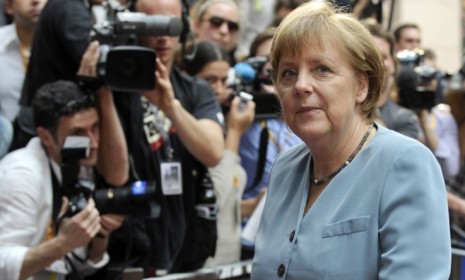Will Europe pool its debt to save Greece?
France is pushing the idea of a common bond — known as a "eurobond" — to stabilize the continent's debt crisis. Germany isn't quite as enthusiastic

European leaders are meeting in Belgium Wednesday to address the continent's worsening debt crisis, and to weigh a radical proposal to overhaul Europe's financial makeup. At the insistence of newly elected French President Francois Hollande, policymakers will discuss whether to create a "eurobond," a jointly-issued borrowing instrument that would essentially transform the euro currency bloc into a common debt pool, grouping the countries' existing IOUs. Creditworthy nations like Germany would offset debt-beleaguered countries like Greece, which would lower the latter's borrowing costs and ease the pressure to slash budget deficits. The proposal comes as Greek voters flirt with exiting the euro over objections to German-backed austerity programs. Will Europe adopt the eurobond?
It should. But Germany won't agree to it: Eurobonds are finally on the menu, and "they are probably just the diet many" debt-saddled countries need, says Nicholas Hastings at The Wall Street Journal. For Spain and Greece, "eurobonds could make all the difference between meeting their obligations and being forced to seek another bailout." The problem is that borrowing costs for Germany, Austria, and other creditworthy nations would rise slightly, and German Chancellor Angela Merkel will likely object to "directly sharing the financial burden" of others.
"Hollande's efforts to push eurobond solution likely to fail"
The Week
Escape your echo chamber. Get the facts behind the news, plus analysis from multiple perspectives.

Sign up for The Week's Free Newsletters
From our morning news briefing to a weekly Good News Newsletter, get the best of The Week delivered directly to your inbox.
From our morning news briefing to a weekly Good News Newsletter, get the best of The Week delivered directly to your inbox.
Merkel hopes to eke by with more modest efforts: The German chancellor's hope for the summit is that a "more growth-friendly agenda and some signs of compromise" will be enough to persuade Greek voters to side with domestic political parties that support continued euro membership, says Paul Ames at Global Post. But let's face facts: "Without drastic action, the eurozone is headed toward a disastrous breakup." Despite her minor concessions, Merkel is "still playing Dr. No."
Actually, Germany might agree to eurobonds: "Clearly, the issuance of joint eurobonds would help to solve Europe's debt crisis" by minimizing the risk of default by Greece and others, says Edward Harrison at The New York Times. And Germany might agree to eurobonds if less creditworthy nations sign on to a "fiscal compact" that essentially gives European leaders more power over the budgets of debt-burdened nations. If Germany is going to take on more risk, it will want more control over how other countries manage their finances.
A free daily email with the biggest news stories of the day – and the best features from TheWeek.com
-
 Political cartoons for January 24
Political cartoons for January 24Cartoons Saturday's political cartoons include 3D chess, political distractions, and more
-
 Ryanair/SpaceX: could Musk really buy the airline?
Ryanair/SpaceX: could Musk really buy the airline?Talking Point Irish budget carrier has become embroiled in unlikely feud with the world’s wealthiest man
-
 Claudette Colvin: teenage activist who paved the way for Rosa Parks
Claudette Colvin: teenage activist who paved the way for Rosa ParksIn The Spotlight Inspired by the example of 19th century abolitionists, 15-year-old Colvin refused to give up her seat on an Alabama bus